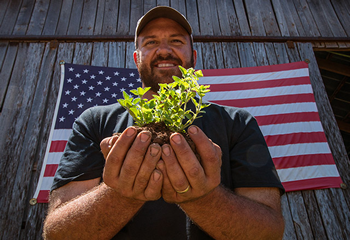Organic Farming: A New Way of Growing

Introduction
Organic farming is an innovative new way of growing food sustainably, by using natural resources and traditional methods while also incorporating modern technology. Doing so helps to preserve the environment while still producing a plentiful bounty of nature’s nourishing offerings, benefiting both the farmers and consumers alike.
Nature’s Bounty: The Benefits of Organic Farming
Organic farming is an eco-friendly approach to food production that meets the global demand for organic produce. Going organic is becoming an increasingly popular trend as people are looking for natural and healthier alternatives to the usual supermarket selections.
1. Healthier Produce:
Organic farming is a healthier way of growing food, since no harsh or synthetic chemicals are used to cultivate the crops and protect them from pests. This means that consumers have access to natural and healthier fruits, vegetables and other staple foods, free from artificial substances and potentially harmful residues.
2. Eco-friendliness:
Organic farming is also great for the environment, as it follows much more sustainable practices when compared to traditional farming methods. This includes:
- Promoting soil health by avoiding the use of harmful synthetic fertilisers and pesticides
- Conserving and protecting natural resources, such as water and land
- Reducing pollution from agricultural byproducts, such as groundwater contamination
3. More Funds for Farmers:
Organic farming also helps to increase the number of funds available to farmers. Selling organic products can help farmers and growers to generate greater revenue, and this in turn can lead to improved market conditions and investment opportunities.
Modern Technology Meets Traditional Growing Methods
Organic farming is made possible by combining modern technology with tried-and-true traditional growing methods. The convergence of new practices and old, along with natural sources such as soil amendment, helps to create a whole, sustainable system that is beneficial to the environment and everyone involved.
1. Improved Soil Quality:
Organic farming focuses on restoration and conservation of soil. This is achieved by minimizing soil degradation, and through the use of natural fertilisers and pest control methods, which in turn improves the overall quality and fertility of the soil.
2. Diversified Crops:
Diversifying crops is an important factor for sustainability, and this is where modern technology comes in. New techniques allow farmers to rotate or mix crops, which encourages the replenishment of the soil and helps to protect against the loss of a single crop due to disease or pests.
3. Integrated Farming System:
Integrated farming involves the use of modern machinery, such as tractors and combines, in order to reduce labor costs and increase efficiency. This, combined with traditional seed saving practices, is a great way to ensure the future of sustainable farming.
Conclusion
Organic farming is a great way to nourish the earth while still providing delicious and healthy produce. By combining traditional growing methods with modern technology, farmers are able to ensure that what they cultivate is beneficial to their immediate environment and the global climate. All of us have a part to play in supporting organic farming, so let’s make the transition to green living today.







Responses